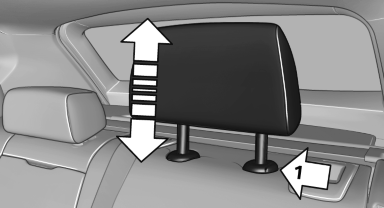Rear head restraints
Correctly adjusted head restraint
A correctly adjusted head restraint reduces the risk of injury to cervical vertebrae in the event of an accident.
![]() Adjusting the head restraint
Adjusting the head restraint
Correctly adjust the head restraints of all
occupied seats; otherwise, there is an increased
risk of injury in an accident.◄
Height
Adjust the head restraint so that its center is approximately at ear level.
Adjusting the height

► To raise: pull.
► To lower: press the button, arrow 1, and
push the head restraint down.
The center head restraint cannot be adjusted in elevation.
Removing
Only remove the head restraint if no one will be sitting in the seat in question.

1. Pull the head restraint upward as far as possible.
2. Press the button, arrow 1, and pull the head
restraint out completely.
![]() Before transporting passengers
Before transporting passengers
Reinstall the head restraint before transporting
anyone in the seat; otherwise, the protective
function of the head restraint is unavailable.◄
See also:
Malfunctions
Steering wheel vibration
Frequent activation of the steering wheel vibration
causes the system to overheat.
This causes the lane departure warning to become
deactivated.
Let the system cool and ...
Maintenance
Maintain the vehicle regularly to sustain the road
safety, operational reliability and the New Vehicle
Limited Warranty.
Specifications for required maintenance measures:
▷ BMW Maintenance ...
Width, height
Width, height
1 Vehicle height without roof-mounted aerial: 56.3 inches/1,430 mm
Vehicle height with roof-mounted aerial: 56.7 inches/1,442 mm
2 Vehicle width, without mirrors: 71.3 inches/1,811 ...
